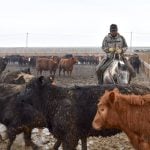Canada ranks seventh on agri-food influence, position has improved
Canada ranks seventh among the G20 in agri-food influence according to a report from Dalhousie University and MNP.
The report ranks the performance of countries’ agri-food sectors across several categories. While 7th overall, Canada ranked second in trade and geopolitics. It cracked the top 10 in categories like competitiveness and sustainability.
Canada is progressing well, said Sylvain Charlebois, who heads the lab that produced the report. He called Canada a second-tier country but at the top of the second tier.
Matt MacDonald is the national leader of food and beverage processing at MNP. He said he was surprised to see Canada rank second in geopolitics, given the number of pivots Canadian agriculture has faced in the last year.
He said it’s difficult to capture the full scope of the situation, but the report gives some hope that Canada is headed in the right direction.
Charlebois cautioned that the ranking may be misleading in terms of geopolitical force. However, Canada has the privilege of good connections with the rest of the world. He said Canada should focus on supporting businesses in their global interactions and support the processing sector to meet its full potential.
Gene edited pig resistant to classical swine fever
Researchers at the University of Edinburgh have created a pig that’s resistant to classical swine fever, a disease also known as “hog cholera.”
The research targeted a protein that helps replicate a group of viruses called pestiviruses. The scientists edited the related gene in pig embryos. Once the pigs grew to adulthood and were exposed to the virus, they showed no sign of infection.
The same genetic edit could theoretically be applied to other livestock species, the University said.
While hog cholera isn’t found in Canada, a different pestivirus is an issue for cattle producers:
bovine viral diarrhea virus. Most of the Canadian cattle herd is vaccinated against BVD, but having another tool for controlling it would be beneficial.
New World screwworm not a worry for Canadian producers; tick is
Canadian cattle producers needn’t worry about New World screwworm, a parasite that has caused major disruptions in the Mexico-U.S. cattle trade.
Canada’s chilly climate should keep the largely tropical pest at bay, said Chris Clark. Clark is an associate professor at the Western College of Veterinary Medicine.
However, the Asian longhorn tick could be a threat said University of Calgary researcher John Soghigian.
The tick carries a parasite that causes bovine anemia. It’s symptoms include fever, weakness, reduced milk production and loss of appetite. The tick is present in more than 15 U.S. states – mostly in the east.
Given the risks of the Asian longhorned tick, Soghigian suggested Canada’s cattle industry should probably be more concerned about it than screwworm. The Canadian Animal Health Surveillance System is tracking its progress in the U.S.








